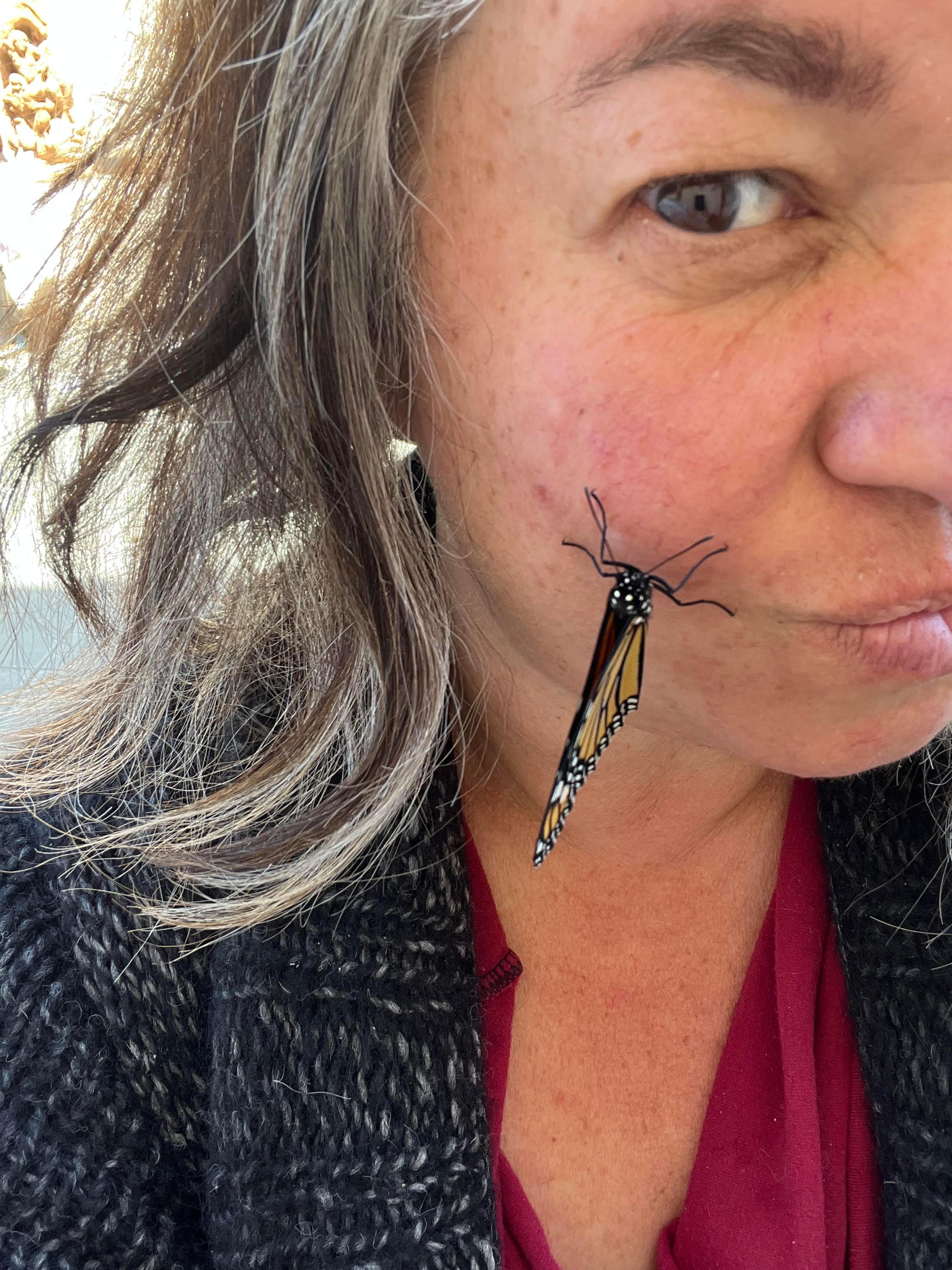How to Break the Cycle of Performance Anxiety
Everyone has experienced anxiety. Often, it comes on the verge of important events: job interviews, art shows, performance evaluations, etc. Here is how to break the cycle of anxiety to present your best self.

By Bara S.
Posted June 13, 2025

Join a free event
Learn from top coaches and industry experts in live, interactive sessions you can join for free.
To my utter surprise and delight, a monarch butterfly kissed my cheek. It had landed on me soon after hatching from its cocoon, unfurling and drying out its wings. In an elongated moment of interspecies connection, everything was alright with the world.

What started as a few caterpillars morphing into butterflies has ended as a perpetual bivouac in my yard ever since. The lesson of the butterfly was not something that I was seeking, but here it was anyway. Their presence has been a profound reminder of how we can thrive–even in adversity–to soar and become our best selves.
“Performance” is both a private and public affair. We take the time and energy to prepare and show up for a task, then deliver. Sometimes, performance occurs in real time as coveted interviews at our dream school. Sometimes, it’s how we earn scores on high-stakes admissions tests or are judged through applications and resumes. Performance can also be a culmination of actions over time like a GPA, job performance evaluations, or a solo art show. These performances, like so many others, demonstrate competency with a given task.
However, when we have performance anxiety and feel nervous or overwhelmed, have negative thoughts, or are afraid of failure, it can impact our output and have a catastrophic effect on our results and success. To this, we say: performances and tests don’t only measure what we know, they also measure how well we show up and execute.
Some students prepare for tests and know the material cold; but, they go into their exams unfocused, discombobulated, and with racing thoughts and queasiness, and, these students often underperform. The same is true for many who are preparing for interviews, athletic matches, or roles in a play. Therefore, integrating tools to manage performance anxiety is important to one’s process and outcome, especially for the applicant seeking entry into college or business school.
Whether your “test” is an actual admissions test, a tennis match, or a presentation to the CEO, who you are and the choices you make in the moment determine whether you can access your knowledge and critical thinking acumen. With test taking, anxiety results in about a 12% decrease in performance, but epic failures of much greater proportions are not uncommon. I hear about them all the time in introductory consults.
So, how do you capture your best self when it counts the most? Why is it that when faced with an opportunity to level up or impress, we often feel more anxiety than excitement and become paralyzed in overwhelming emotion? Let’s revisit the butterflies.
In their lives, butterflies experience four seamless transformations: caterpillars hatch from eggs, become pupae in cocoons, emerge into butterflies, and then die. I’ve witnessed close to 100 of these transformations, and each time it is done with ease, grace, and trust. Okay–it’s true that when becoming cocoons, they hang upside down and do a bit of a jig as they zip into their new forms, but there have been zero panic attacks! They move through each stage without question or pushback. They flow into their change and by doing so, demonstrate to us how courage and trust can help us transform into our ideal selves.
If the butterflies can do it, we can too.
Yes, change can be uncomfortable beyond mere “butterflies” in our stomach, but, when we commit to our own metamorphosis and face our fears head-on, we can embody the caterpillar preparing to take flight.
I promise this is not a new-age, woo-woo incantation for transformation. Rather, it is an invitation to adopt down-to-earth reframes and a growth mindset that will prompt thriving in challenges and perceiving failure as an opportunity for learning, rather than a fixed and negative reflection of our abilities. By desiring change and disrupting current patterns, we can derive new ways to gracefully ride the wave. After all, if we remain in an incubation mode–safe from the outside world and the opportunities within reach–we hinder our own growth.
I find it helpful to keep the butterfly in mind whenever I pivot away from old habits, self-limiting thoughts, or negative belief patterns, in order to become fully centered. If you consider that the caterpillar transforms arduously into a butterfly within only three weeks, you’ll immediately gain perspective on your own process, which may be months or years in the making!
How will you diffuse the unwanted feelings that refuse to depart? For me, it’s walking in nature where I can breathe clean air, meditation with focused deep breathing, self-hypnosis, tapping/EFT, or some good raucous belly laughs from a Netflix comedy. What will you do to arrive at your most calm and present self?
Consider adopting tools that work the best for you to interrupt unwanted patterns and manage or eliminate the undesired, distracting thoughts. Course correct until your response becomes second nature. When you have reliably released the patterns that before were roadblocks to your metamorphosis and success, then it is time to soar!
The key is staying present, curious, and ushering in ‘pattern-interupts,’ instead of focusing on why you feel discomfort. Identify whether your symptoms are telling you something important. Notice how they impact you, then deploy techniques to eliminate the unwanted feelings so that you can feel more present, calm, and empowered.
As you prepare for a test, big interview, presentation, or even challenging conversation, take time to consider these questions. Exploring and expressing our trepidation and fear may be enough to quell the anxiety and transcend the discomfort.
- Who do you want to become?
- How will you transform from your present to your future self and what is the smallest next step to get there?
- How can you celebrate your abilities and expressions with ease, despite the fluttering in your stomach?
- Can you reframe your anxiety into excitement for what lies ahead, knowing it is important and realistically achievable?
- What needs to be put in place for you to succeed effortlessly, considering time and resources?
- Are you willing to initiate grit?
- How will you release complicated or uncomfortable feelings?
- Are you willing to adapt to unwanted feelings instead of giving them energy and power?
- And, if your feelings don’t serve you, how will you acquire a more desired state instead?
Beyond useful, it can be fun to experiment with how quickly introspection, creativity, and grounding can help you achieve your desired outcome, and how this parlays into your overall mental health. Meeting goals helps you feel fully engaged and perform authentically and unhampered. All this allows you to spread your wings and fly, majestically like the monarch, especially when it counts the most.
I'd love to empower you to overcome the performance anxieties in your life. Head to my profile and book a free intro call to get started.

Written by Bara
0.0
(0)
Bara Sapir, CEO of MindFlow and City Test Prep is an expert coach and master educator with over 30 years of experience teaching test preparation and test anxiety relief. She is a pioneer in the test prep industry with a mindful test-taking modality only available at City Test Prep, and now, through Leland. Bara taught test prep for six years as an instructor for The Princeton Review, was a solopreneur for several years then opened her test prep company, City Test Prep (2005). She and her team of test experts, provide individualized tutoring and ensure their clients score their best by fully addressing the four pillars of test-taking success: - Content Mastery - Test Taking Strategy - Time Management (through accelerated reading methods) - Optimal Mindset She starts with an initial conversation, intake and evaluation of a diagnostic test. Each study plan addresses each student's unique needs, improving weak areas and meeting their goals, schedule, and timeline. Optimal Mindset Sapir initiated bringing mindful and holistic techniques to the test preparation study regime, work similar to that of sports psychologists working with world-class athletes. She helps students reduce anxiety and enhance concentration, confidence, and ease. These full potential tools are drawn from hypnosis, Neuro-linguistic programming, mindfulness, bilateral stimulation, Tapping, EMDR, peripheral vision, sound therapy, growth mindset, integrated life coaching, reframing, and more self-actualization modalities. As students optimize their test-taking experience, they perform better , and earn higher scores. Sessions are customized to each student's needs. Bara has coached hundreds of clients including: - Students who were accepted to leading high schools, boarding schools, universities, and boarding schools, such as Columbia, Dartmouth, Duke, Harvard, INSEAD, London School of Business, Northwestern, Stanford, University of Chicago, UCLA, UC-Berkeley, and the University of Pennsylvania. - Physicians taking high-level medical boards - Leading entertainment and advertising professionals - Advisors to U.S. government leaders - Executives at Fortune 500 companies Bara’s expertise has been featured in magazines and newspapers, including The Wall Street Journal, Cosmogirl, Next Step, CNN/Fortune Magazine, The Jewish Forward, Women’s World and Positive Thinking. She has appeared on television, including CBS Bay Sunday, on the radio, including programs on National Public Radio (NPR), and is a regular speaker on webinars (Accepted.com, Forte Foundation, IECA) at conferences (IECA, HECA, AET, NTPA, AIGAC, NTA), as well as a guest speaker in schools. Bara co-wrote The Full Potential GMAT Sentence Correction Intensive, wrote The Full Potential Manual, and the upcoming Sentence Correction EA, all published by Nova Press. She created MindFlow: the Mindful Speed Reading Workshop for middle school, high school, college and for adults, offered in person monthly and as an online course. And to bring it to a wider audience, and the online training platform, MindFlow https://mindflowspeedreading.com She also created/produced the Full Potential Audio (sample on the City Test Prep website). Bara held a 3- year post on the board of directors of the National Test Prep Association, is a board member of the Networking Entrepreneurial Women of Marin (NEWofMarin), on the leadership of the Association of International Graduate Admissions Consultants (AIGAC), and a co-founder and co-host on MBAWaves, a weekly program on LinkedIn Live/FaceBook and YouTube with Eric Lucrezia of Candidate Coach and author of The Getting into MBA series. Bara holds a Masters degrees in Education from the Jewish Theological Seminary and Art History from the University of Michigan. She has certification in Hypnosis, Neuro-linguistic Programming, Integrative Life Coaching, Counseling from Interchange, Mindfulness-Based Stress Reduction, and is a Reiki practitioner. She is a published author, professional artist and an ordained kohenet. Bara conducts workshops for students, parents, educators, business people, and creative professionals seeking high-performance results at school, work, and in life. Bara lives with her rescue pups, Chata and Murphy, foster dog Koda, and is a huge advocate for shelter/rescue dogs (https://animaladvocates.info)
Bara has helped clients get into organizations like:
Browse hundreds of expert coaches
Leland coaches have helped thousands of people achieve their goals. A dedicated mentor can make all the difference.



















